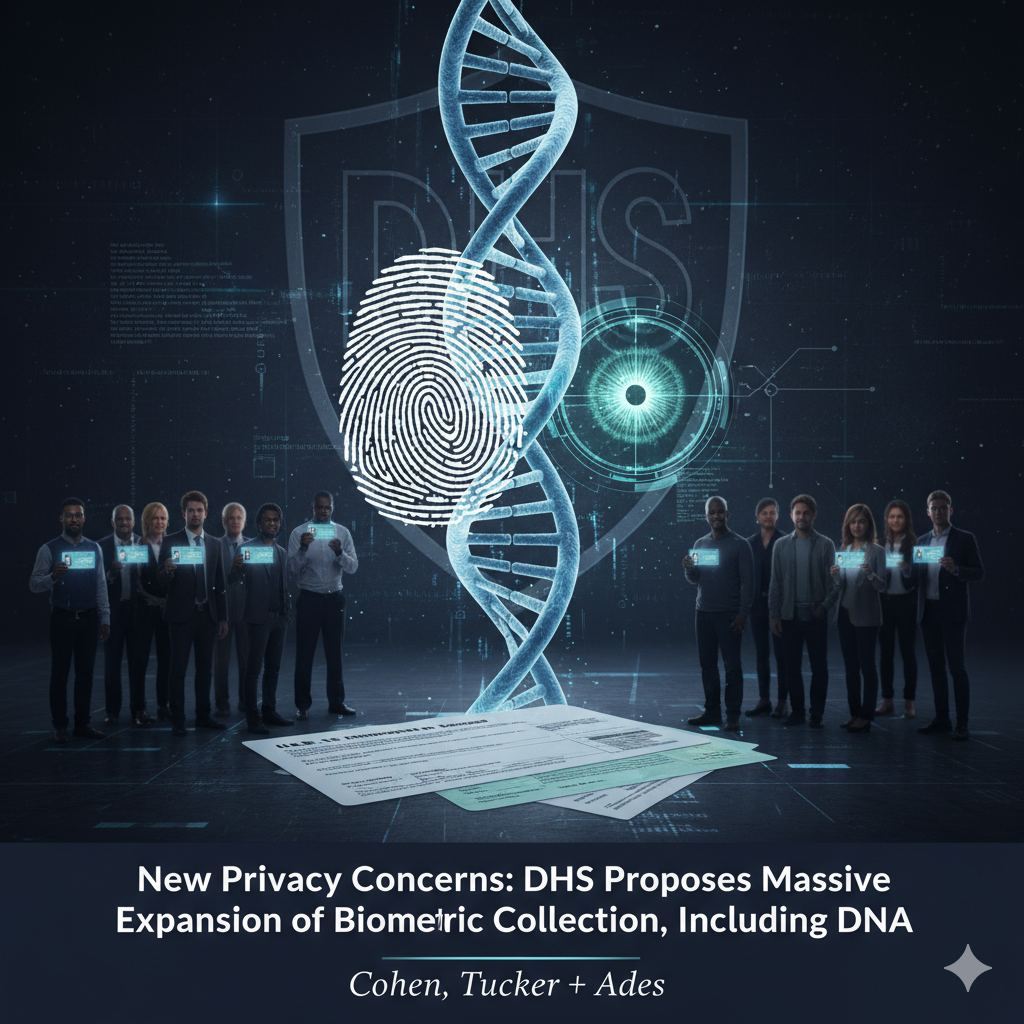New Privacy Concerns: DHS Proposes Massive Expansion of Biometric Collection, Including DNA, for Benefit Applicants
Authored by Wendy R. Barlow, Esq.

Cohen, Tucker + Ades is closely tracking a controversial proposed rule by the Department of Homeland Security (DHS) that seeks to dramatically expand the collection of biometrics from applicants for immigration benefits. If finalized, this rule would represent an unprecedented intrusion into the privacy of individuals seeking immigration benefits.
What is the Proposed Rule?
The proposed rule, put forward by U.S. Citizenship and Immigration Services (USCIS) and other DHS components, would overhaul existing biometrics regulations. It seeks to allow the government to collect a broad array of biometric data from nearly every applicant, petitioner, sponsor, or beneficiary—including minors and U.S. citizens associated with a petition—at any point during the immigration process.
Most notably, the rule proposes expanding biometric collection to explicitly include DNA, iris scans, voice prints, and palm prints.
Who Would Be Affected?
The scope of this proposal is vast, potentially affecting almost anyone interacting with the immigration system, not just applicants for asylum or naturalization. This includes:
-
Minors: Biometric collection could be mandated for minors under the age of 14, who are currently exempt from most requirements.
-
U.S. Citizens: U.S. citizens petitioning for or sponsoring relatives could be required to submit biometric data, including DNA, simply for filing an application.
-
All Benefit Applicants: Individuals applying for green cards, work permits, temporary protected status (TPS), and other benefits would be subject to this expanded collection.
Why is This Expansion So Concerning?
The proposed rule raises serious legal and ethical issues, primarily regarding privacy, security, and the government’s scope of authority:
-
DNA Collection: Collecting DNA from benefit applicants is a massive escalation that crosses major privacy boundaries. DNA contains vast amounts of personal and familial information, and its collection raises serious questions about who can access this data and for what purposes it will be used and retained.
-
Data Retention and Sharing: The rule would grant DHS the authority to collect biometrics and retain them indefinitely, regardless of whether the application is approved or denied. It also provides a broad legal basis for sharing this data with other government agencies, dramatically increasing surveillance risk.
-
Deterrence for Applicants: Introducing mandatory DNA and other invasive biometric collection could deter eligible individuals, particularly asylum seekers or crime victims, from applying for crucial immigration benefits due to fears regarding privacy breaches or potential information sharing with foreign governments.
How Our Firm is Responding
Cohen, Tucker + Ades believes that while security is important, it must not come at the cost of fundamental civil liberties and privacy rights. We are actively:
-
Analyzing the Rule: We are thoroughly reviewing the full text of the proposed rule to understand its precise implications and identify areas of legal challenge.
-
Monitoring Public Comments: We encourage all stakeholders—applicants, advocacy groups, and concerned citizens—to submit comments to DHS during the public notice period.
-
Preparing for Litigation: We anticipate that if this rule is finalized in its current form, it will face immediate and significant legal challenges.
If you have questions about how this proposed rule might impact your current or future immigration application, please contact our firm. We are here to guide you through the complexities of evolving U.S. immigration policy.
Disclaimer: This blog post addresses a proposed rule and is intended for informational purposes only. It does not constitute legal advice. You should consult with an attorney regarding your specific situation.
Sources:
Bloomberg News | US Plan Requires Biometrics From All Immigration Benefit Seekers
Not sure which option is right for you? Request a confidential consultation today.

